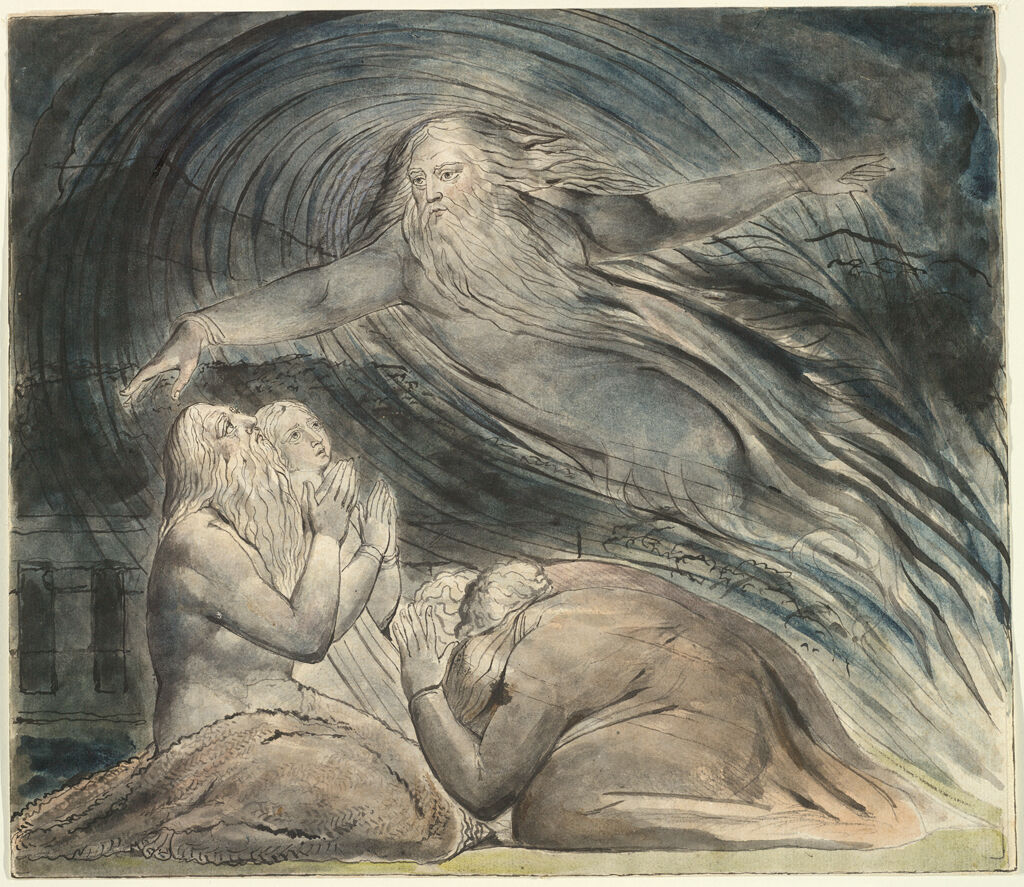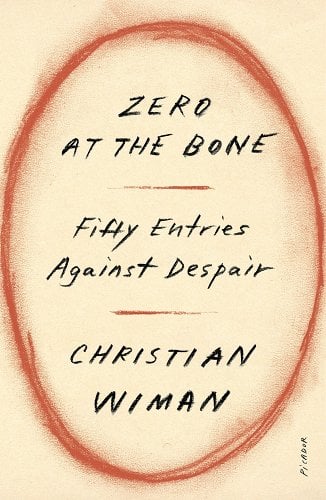Grove City, PA. Zero at the Bone: Fifty Entries Against Despair. The title of Christian Wiman’s new book is a seed that sprouts and unfurls and blooms over the course of its nearly three hundred pages of prose and poetry. I’ll begin with the subtitle: What is despair, and What does it mean to make entries against it?
Despair is a multifaceted experience, and Wiman is well acquainted with its various permutations. At times despair can be intense and indeed ecstatic, but it’s also numbingly mundane. It’s the cancer that confronts Wiman with his mortality and exposes him to excruciating pain. And it’s also the ache that accompanies every bowl of cereal, creak of the ironing board, and paying of bills: Nothing will change, purposeless suffering is definitive, and doubts will never resolve into even fragmentary epiphanies.
Despair’s results are likewise manifold. At times, despair isolates Wiman and turns him into a walking shadow. At other times, though, it whittles away the superfluities of life and exposes its divine core. Responding to Emily Dickinson’s “A Pit—but Heaven over it—,” Wiman meditates on the tension her opening image articulates: “I am tired of the word ‘despair.’ The drama that attaches to it detracts from the dull actuality that usually obtains, when one can’t even read poetry, much less write it; one can’t believe in life, much less God. And in those instances when it’s not entirely dull? An electroconvulsive cold, an incandescent dark, still a pit, to be sure, and still quite annihilating—but the stun of heaven over it!”
The challenge for Wiman is neither to evade despair nor to wallow in it. As he acknowledges, “the line is fine . . . between articulation and cultivation, between despair as affliction and despair as sustenance.” His aim, then, is to set despair in its proper context: In Dickinson’s terms, to name despair as a pit, but a pit with Heaven over it.
This is what he is after in making entries “against” despair. Wiman clarifies what he intends by this preposition:
By “against” in the subtitle of this book I don’t mean to imply a “position.” I’m not against despair in the way that I’m against, say, Donald Trump. In fact I’m sometimes very much in favor of despair when it’s a realistic appraisal of odious circumstance—like Donald Trump. But despair, like most human qualities, can be both sinful and salvific. Acedia, for instance, is a kind of spiritual inertia, an uncontested torpor, and is in Catholicism a mortal sin. The dark night of the soul, on the other hand, is an annihilating but necessary prelude to a renewed awareness of God. At the moment, in truth, either would seem a relief to me. Would have a name and a pedigree. Fifty entries against despair?
If Wiman’s self-appointed task in this book seems strange, even to himself, it makes a lot of sense for a poet to respond to one perplexing facet of reality by setting other realities against or alongside of it. All metaphor sets two things against one other so that both are changed by the relationship. This is what Wiman does again and again in his book: he sets the reality of his cancer, his doubts, his suffering and despair alongside other realities, and the meaning of his experiences shifts and deepens in these new relationships. Across these fifty entries, the reality of despair is set against the realities of joy, faith, neuroscience, art, prayer, quantum physics, bodily exercise, animal suffering, Christ’s suffering, beauty. Some entries are poems, others memoir, others literary criticism, and some even consist of commonplaces—quotations gathered from other authors—that address a similar topic. How are all these entries against despair? Insofar as metaphor is an act that creates meaning, it’s an act of hope: even intractable realities can be changed by placing them in new relationships. And if this conviction seems too poetic or mystical, Wiman reminds readers that quantum physics holds that “existence is relation.”
In one of his poems, Wiman records what he terms “a mite of peace”: “It’s not that of two truths you’ve chosen wrongly, / but that in choosing you’ve wronged it all.” In a similar vein, he cites Niels Bohr: “It is the hallmark of any deep truth that its negation is also a deep truth.” Drawing on Walter Brueggemann, Wiman concludes one entry by pondering the role poetry might play in naming such paradoxical truths: “‘Nothing but grief could permit newness. Only a poem could bring the grief to notice.’ Both true. Both ambiguous gifts of God. And that’s why Prado’s poem [“Love Song”]—and this essay [“Ifs Eternally”], and this whole damn book—all have the names they have.” It is false to ignore suffering and atrocity. It is also false to ignore beauty and joy.
The result of such metaphor mash-ups, such incongruous conjunctions, is the kind of awe that the title of Wiman’s book names. “Zero at the Bone” is the last line of a Dickinson poem, one where she strives to name the feeling produced by encountering a snake. A brush with danger, with the primordial totem of sin, generates a sublime, uncanny shiver—a shiver that is at once fear and awe and more. And Wiman points out that even the snake, which seems inevitably linked to sin and the fall, can be seen in other lights. According to the Kabbalistic Zohar, “zero is another name for God. That shape without beginning or end, that emptiness that is All.”
Such awe is at the heart of Wiman’s religious faith. He confesses this faith quite plainly: “I am a Christian. Which means I have faith.” But Wiman, contrary to popular belief, doesn’t think faith is an opiate that dulls pain and brings happiness:
One doesn’t follow God in hope of happiness but because one senses—miserable flimsy little word for that beak in your bowels—a truth that renders ordinary contentment irrelevant. There are some hungers that only an endless commitment to emptiness can feed, and the only true antidote to the plague of modern despair is an absolute—and perhaps even annihilating awe. “I prayed for wonders instead of happiness, Lord,” writes the great Jewish theologian Abraham Joshua Heschel, “And you gave them to me.”
This seems to be Wiman’s prayer as well: wonder not happiness, awe as antidote to despair. Thus, he concludes this entry by naming the unsettling role that faith plays in his life: “I have found faith to be not a comfort but a provocation to a life I never seem to live up to.”
The fiftieth entry consists of a poem titled “No Omen but Awe”:
I thought it would all resolve
one day in diamond time.
Life like a gem to lift to the squint
as through a jeweler’s loupe.
I thought every facet and flaw
neither facet nor flaw in some final shine;
chance and choice uncanny cognates;
form, fate.
Now I am here.
No diamond, no time, no omen but awe
that a whirlwind could in not cohering cohere.
Loss is my gift, bewilderment my bow.
These fifty entries against despair, these fifty facets of reality, don’t resolve into some hard and perfect gem. They cohere in the same way that God’s speech to Job from the whirlwind coheres. They bestow not some final understanding, but awe and bewilderment.
As Wiman writes about the so-called message of Job, “there is no ‘explanation’ of suffering. . . I’m not even sure that suffering is its real subject, which I think is mostly focused on how—and indeed whether—a human being can relate to God at all. Job’s deepest question is not Why is this happening to me? No, his deepest question, even in the worst of his curses, is Where are you, Lord?” Hence, God’s response to Job from the whirlwind primarily conveys his presence, his intimate involvement in all of creation and in Job’s life. Wiman is clear that God’s depiction of the glories of creation is not a direct response to Job’s suffering and despair. “Beauty is not compensatory for the lack of justice in this life,” Wiman explains. “Job’s vision of God is a mystical experience that doesn’t make sense of suffering but renders the question—not irrelevant, exactly, but relevant only to one whose entire orientation to reality has been tried and transformed.”
Like Job, Wiman doesn’t receive some propositional answer to his despair. He receives awe. And this awe is sharpened by setting the contrary facets of reality side-by-side. Somehow, he confesses, “I know in my bones there is no escape from necessity, and know in my bones that God’s love reaches into and redeems every atom that I am. I believe the right response to reality is to bow down, and I believe the right response to reality is to scream. Life is tragic and faith is comic. Life is necessity and love is grace. (Reality’s conjunction is always and.) I have never felt quite at home in this world, and never wanted a home altogether beyond it. Does that make sense? Of course it doesn’t.”
Image credit: William Blake, “Then the Lord Answered Job Out of the Whirlwind”






